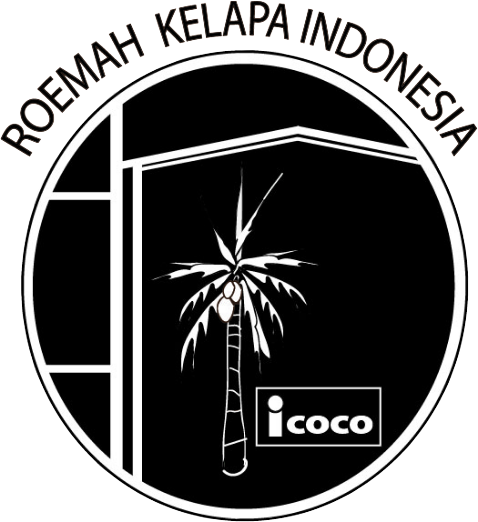
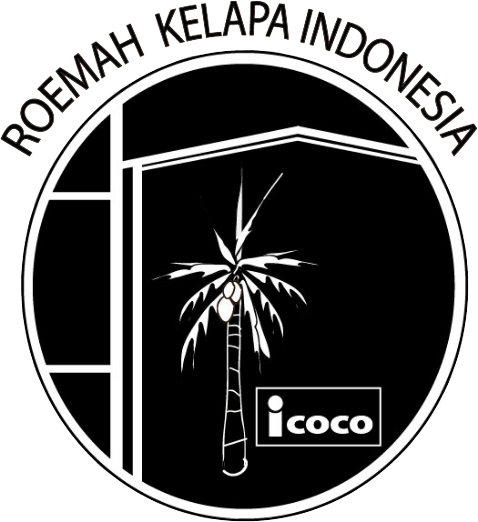
Roemah Kelapa Indonesia Group




BAPPENAS
BAPPENAS
RoeKI’s Strategic Engagement with Bappenas – Driving Indonesia’s Coconut Downstream Roadmap and National Projects
Roemah Kelapa Indonesia (RoeKI) has been actively responding to the invitation from Bappenas (National Development Planning Agency) to play a pivotal role in shaping the Indonesian Coconut Downstream Roadmap. This collaboration reflects a shared vision: transforming Indonesia’s vast coconut resources into high-value products, boosting farmer incomes, and positioning the country as a global leader in the coconut industry.
1. Crafting the Indonesian Coconut Downstream Roadmap
Under Bappenas’ coordination, RoeKI has contributed data, market analysis, and value chain insights to design a comprehensive Coconut Downstream Roadmap that covers:
Upstream Revitalization – Replanting programs, seed and seedling innovation (including embryo tissue culture), and farmer empowerment.
Midstream Modernization – Development of integrated processing hubs, quality certification systems, and sustainable technology adoption.
Downstream Diversification – Expanding into premium global markets for food, health, cosmetics, bioenergy, and eco-industrial applications.
2. Engaging in Strategic National Project Discussions
In alignment with Bappenas’ National Strategic Projects (PSN) framework, RoeKI is actively involved in discussions to:
Identify coconut-related projects that meet national priority criteria for long-term economic impact.
Secure multi-stakeholder partnerships for financing, infrastructure development, and technology transfer.
Integrate coconut development with broader national agendas, including rural revitalization, food sovereignty, and green economic growth.
3. Pioneering MCT (Medium Chain Triglycerides) Development in Indonesia
RoeKI has proposed and initiated the concept of building Indonesia’s first large-scale MCT production facilities, capitalizing on the country’s abundant supply of high-quality coconuts.
Strategic Importance: MCT oil is a high-demand health and nutrition product in global markets, widely used in sports nutrition, medical applications, and functional foods.
Value Addition: Establishing domestic MCT production will capture higher margins, reduce raw material exports, and strengthen Indonesia’s downstream processing sector.
Global Competitiveness: This initiative positions Indonesia as not only the largest coconut producer, but also a key supplier of high-value, science-based coconut derivatives.
4. The Intensity of RoeKI’s Commitment
From high-level policy dialogues to technical workshops, RoeKI’s engagement with Bappenas has been continuous and intensive:
Participating in multi-agency coordination meetings on roadmap alignment.
Leading focus group discussions with stakeholders from government, academia, industry, and farmer cooperatives.
Preparing technical proposals and feasibility studies for priority projects, including the MCT initiative.
Advocating for policy support and incentives to accelerate downstream investment.
MEANING OF THE DOWNSTREAM ROADAP FOR INDONESIA’S COCONUT SECTOR
From coconut farms to world-class industries — building prosperity through downstreaming
The Meaning of the Downstream Roadmap for Indonesia’s Coconut Sector
The downstream roadmap for Indonesia’s coconut industry represents a national strategic framework designed to maximize the value of coconut resources across the entire supply chain. It provides clear direction on how to move beyond the export of raw materials and instead develop a wide range of high-value derivative products—ranging from food, health, and cosmetics to bioenergy and industrial applications.
For Indonesia, as the world’s largest coconut producer, this roadmap is not only an economic agenda but also a social and environmental one. It ensures that farmers benefit from better market access and fair prices, while industries gain from innovation, added value, and global competitiveness. Moreover, the roadmap creates opportunities for young generations, entrepreneurs, and researchers to actively contribute to modernizing the sector through technology, sustainable practices, and new business models.
In essence, the downstream roadmap is about transforming Indonesia’s coconut sector into a resilient, competitive, and future-ready industry that uplifts farmers, drives national prosperity, and strengthens Indonesia’s role in global sustainable supply chains.
Conclusion
The roadmap for Indonesia’s coconut downstreaming is not only a strategic blueprint for industrial development but also a unifying vision that connects farmers, industries, governments, and global partners. By moving beyond raw exports and advancing into value-added products, Indonesia can secure higher income for farmers, create millions of sustainable jobs, and strengthen its position as a leader in the global coconut economy. This roadmap stands as a commitment to sustainability, innovation, and prosperity for future generations.
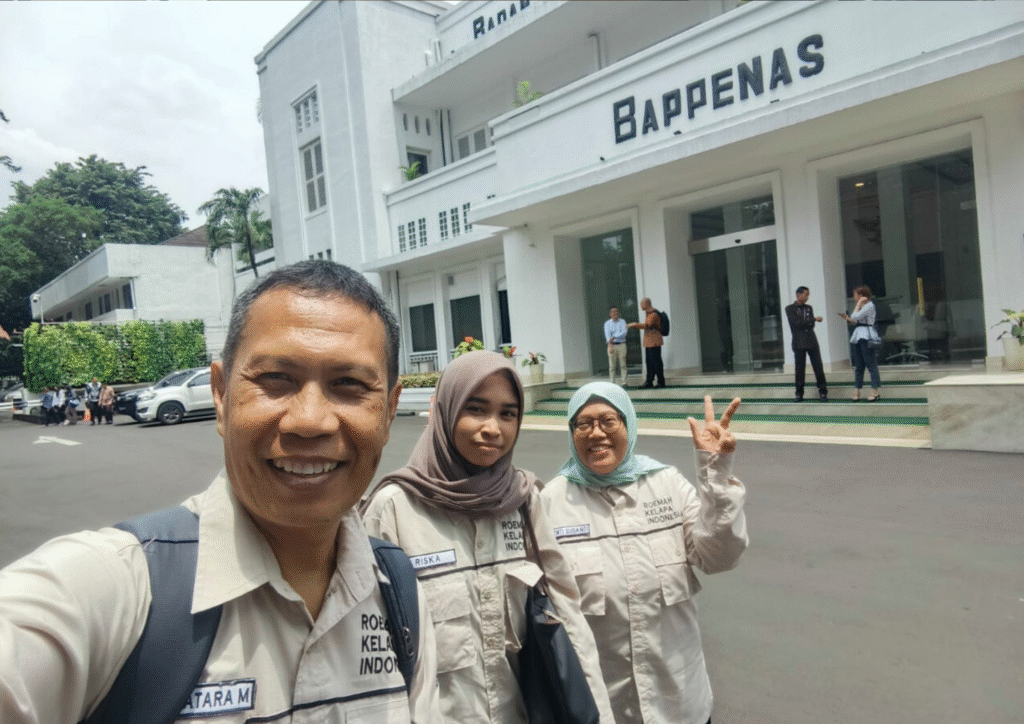
Collaborative Meeting: RoeKI, IPB, and Bappenas Driving National Coconut Development Strategies
RoeKI’s partnership with Bappenas is not just a consultation—it is a strategic alliance to define, design, and deliver a future where Indonesia’s coconut industry is fully modernized, globally competitive, and deeply rooted in national economic priorities. The roadmap, the national strategic projects, and the MCT initiative together form a transformational agenda that will mark Indonesia’s leadership in the global coconut economy.


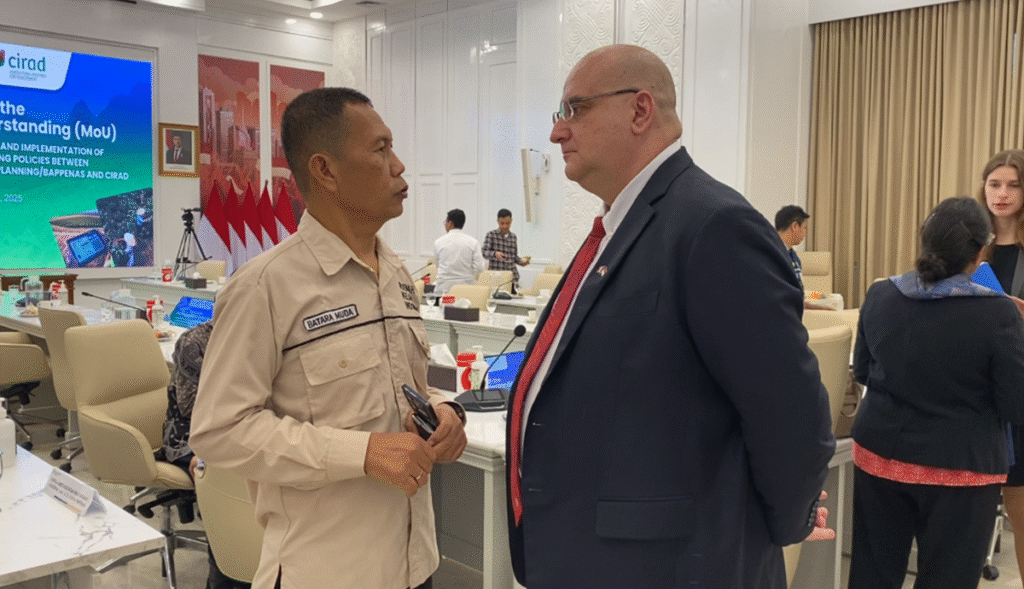




RoeKI’s Strategic Engagement with Bappenas – Driving Indonesia’s Coconut Downstream Roadmap and National Projects
Roemah Kelapa Indonesia (RoeKI) has been actively responding to the invitation from Bappenas (National Development Planning Agency) to play a pivotal role in shaping the Indonesian Coconut Downstream Roadmap. This collaboration reflects a shared vision: transforming Indonesia’s vast coconut resources into high-value products, boosting farmer incomes, and positioning the country as a global leader in the coconut industry.
1. Crafting the Indonesian Coconut Downstream Roadmap
Under Bappenas’ coordination, RoeKI has contributed data, market analysis, and value chain insights to design a comprehensive Coconut Downstream Roadmap that covers:
Upstream Revitalization – Replanting programs, seed and seedling innovation (including embryo tissue culture), and farmer empowerment.
Midstream Modernization – Development of integrated processing hubs, quality certification systems, and sustainable technology adoption.
Downstream Diversification – Expanding into premium global markets for food, health, cosmetics, bioenergy, and eco-industrial applications.
2. Engaging in Strategic National Project Discussions
In alignment with Bappenas’ National Strategic Projects (PSN) framework, RoeKI is actively involved in discussions to:
Identify coconut-related projects that meet national priority criteria for long-term economic impact.
Secure multi-stakeholder partnerships for financing, infrastructure development, and technology transfer.
Integrate coconut development with broader national agendas, including rural revitalization, food sovereignty, and green economic growth.
3. Pioneering MCT (Medium Chain Triglycerides) Development in Indonesia
RoeKI has proposed and initiated the concept of building Indonesia’s first large-scale MCT production facilities, capitalizing on the country’s abundant supply of high-quality coconuts.
Strategic Importance: MCT oil is a high-demand health and nutrition product in global markets, widely used in sports nutrition, medical applications, and functional foods.
Value Addition: Establishing domestic MCT production will capture higher margins, reduce raw material exports, and strengthen Indonesia’s downstream processing sector.
Global Competitiveness: This initiative positions Indonesia as not only the largest coconut producer, but also a key supplier of high-value, science-based coconut derivatives.
4. The Intensity of RoeKI’s Commitment
From high-level policy dialogues to technical workshops, RoeKI’s engagement with Bappenas has been continuous and intensive:
Participating in multi-agency coordination meetings on roadmap alignment.
Leading focus group discussions with stakeholders from government, academia, industry, and farmer cooperatives.
Preparing technical proposals and feasibility studies for priority projects, including the MCT initiative.
Advocating for policy support and incentives to accelerate downstream investment.
MEANING OF THE DOWNSTREAM ROADAP FOR INDONESIA’S COCONUT SECTOR
From coconut farms to world-class industries — building prosperity through downstreaming
The Meaning of the Downstream Roadmap for Indonesia’s Coconut Sector
The downstream roadmap for Indonesia’s coconut industry represents a national strategic framework designed to maximize the value of coconut resources across the entire supply chain. It provides clear direction on how to move beyond the export of raw materials and instead develop a wide range of high-value derivative products—ranging from food, health, and cosmetics to bioenergy and industrial applications.
For Indonesia, as the world’s largest coconut producer, this roadmap is not only an economic agenda but also a social and environmental one. It ensures that farmers benefit from better market access and fair prices, while industries gain from innovation, added value, and global competitiveness. Moreover, the roadmap creates opportunities for young generations, entrepreneurs, and researchers to actively contribute to modernizing the sector through technology, sustainable practices, and new business models.
In essence, the downstream roadmap is about transforming Indonesia’s coconut sector into a resilient, competitive, and future-ready industry that uplifts farmers, drives national prosperity, and strengthens Indonesia’s role in global sustainable supply chains.
Conclusion
The roadmap for Indonesia’s coconut downstreaming is not only a strategic blueprint for industrial development but also a unifying vision that connects farmers, industries, governments, and global partners. By moving beyond raw exports and advancing into value-added products, Indonesia can secure higher income for farmers, create millions of sustainable jobs, and strengthen its position as a leader in the global coconut economy. This roadmap stands as a commitment to sustainability, innovation, and prosperity for future generations.

Collaborative Meeting: RoeKI, IPB, and Bappenas Driving National Coconut Development Strategies
RoeKI’s partnership with Bappenas is not just a consultation—it is a strategic alliance to define, design, and deliver a future where Indonesia’s coconut industry is fully modernized, globally competitive, and deeply rooted in national economic priorities. The roadmap, the national strategic projects, and the MCT initiative together form a transformational agenda that will mark Indonesia’s leadership in the global coconut economy.








CO-OPERATON WITH LOCAL GOVERNMENTS
INHIL DISTRICT, RIAU PROVINCE
CO-OPERATON WITH LOCAL GOVERNMENTS
INHIL DISTRICT, RIAU PROVINCE
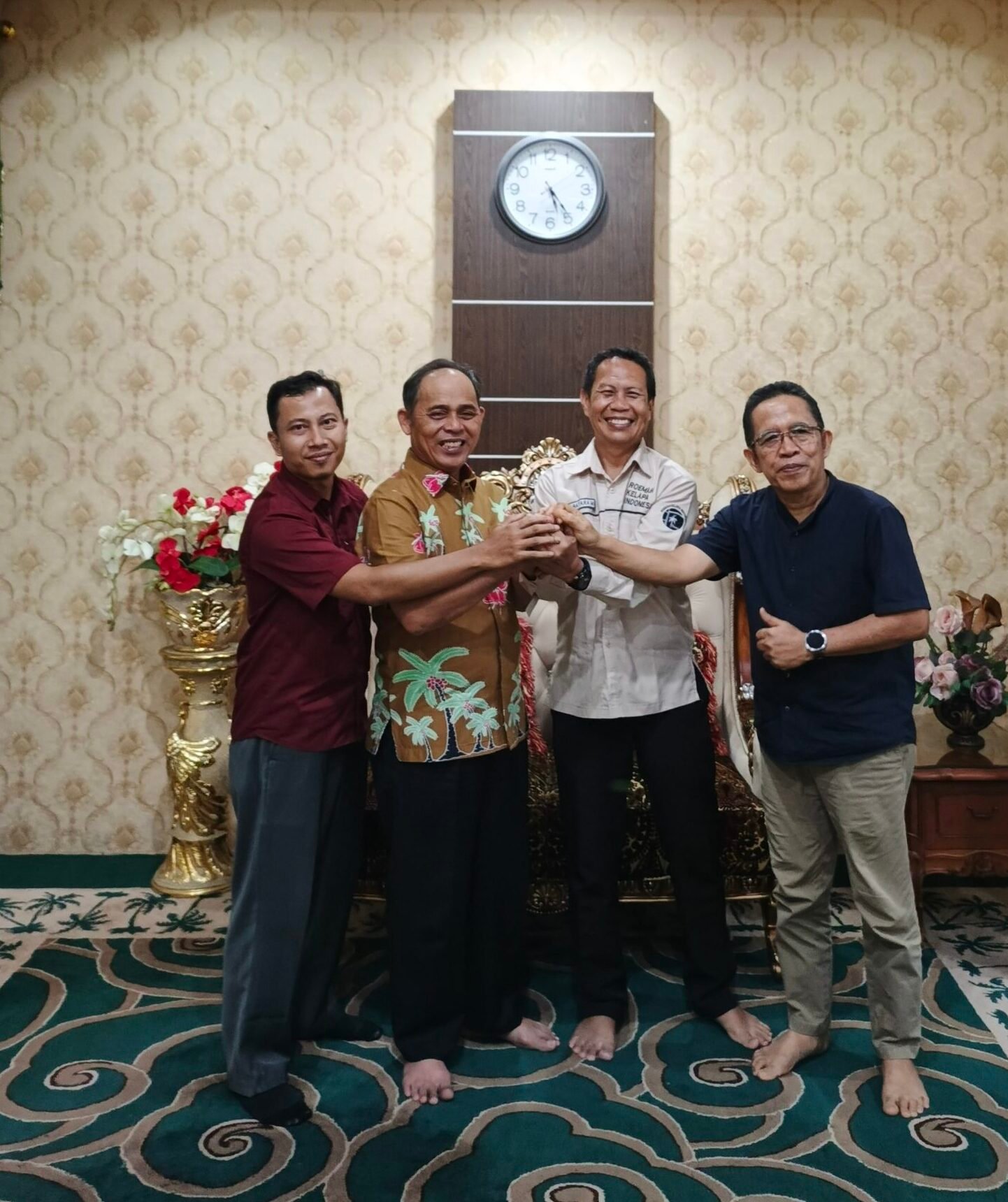
MERANTI DISTRICT, RIAU PROVINCE
MERANTI DISTRICT, RIAU PROVINCE

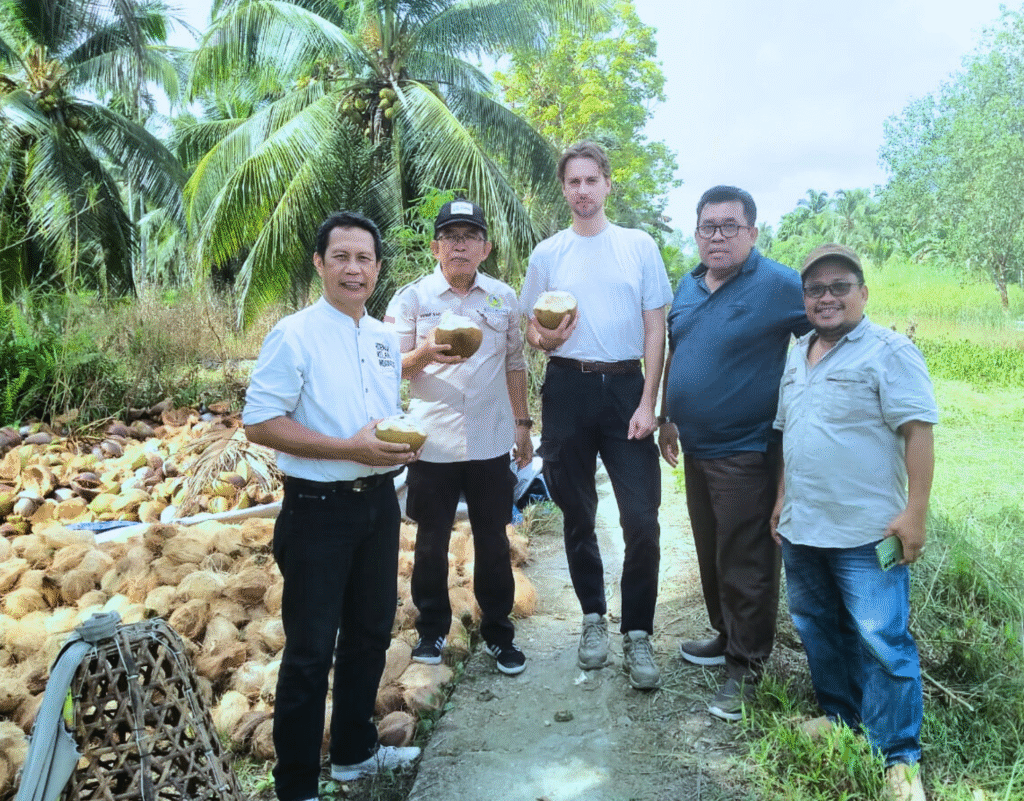

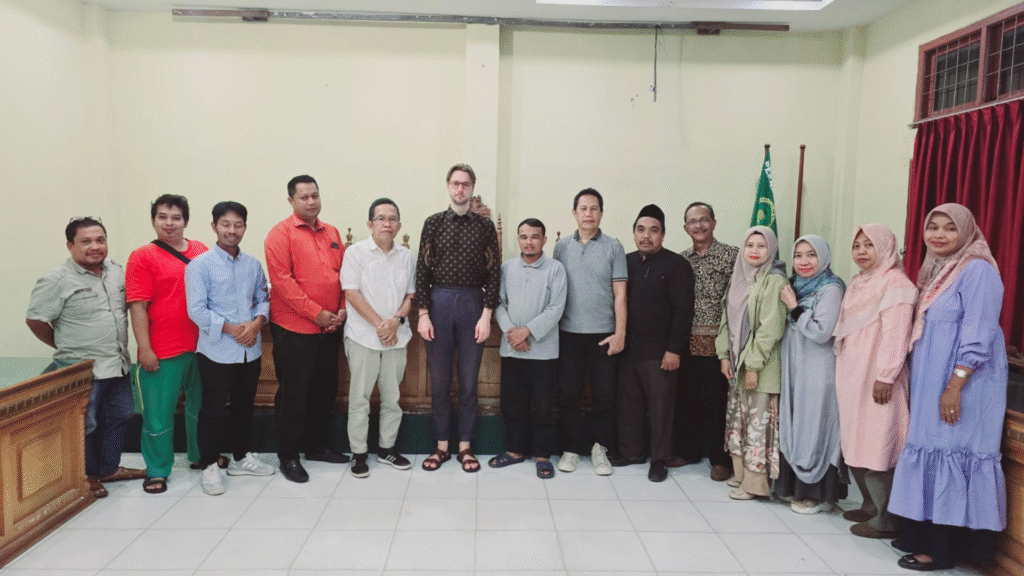

MERANTI DISTRICT, RIAU PROVINCE




INTERNATIONAL CO-OPERATION
INTERNATIONAL CO-OPERATION
SYDNEY - AUSTRALIA
RoeKI’s Global Journey – Elevating Indonesia’s Coconut to the World Stage
Through a consistent presence in key international forums, RoeKI has strengthened the image of Indonesian coconut as a premium, sustainable, and versatile commodity. This global outreach not only enhanced brand recognition but also opened concrete pathways for market access, export opportunities, and long-term positioning of Indonesia as a world leader in coconut products.
SYDNEY - AUSTRALIA
RoeKI’s Global Journey – Elevating Indonesia’s Coconut to the World Stage
Through a consistent presence in key international forums, RoeKI has strengthened the image of Indonesian coconut as a premium, sustainable, and versatile commodity. This global outreach not only enhanced brand recognition but also opened concrete pathways for market access, export opportunities, and long-term positioning of Indonesia as a world leader in coconut products.
Roemah Kelapa Indonesia (RoeKI), visited Sydney, Australia to introduce the vast potential of Indonesia’s coconut sector and to engage with prospective investors. The visit highlighted the importance of government support in fostering strong bilateral cooperation, enabling Indonesia to unlock its extraordinary coconut resources. Through international partnerships, RoeKI seeks to strengthen the industry, empower millions of farmers, and position Indonesia as a global leader in sustainable coconut-based products.
Mr. Ir. Mulyadi Sukandar, representing Roemah Kelapa Indonesia (RoeKI), his visit was aimed at promoting awareness of the current state and challenges of the Indonesian coconut sector while actively engaging with potential investors.
During the program, Mr. Sukandar highlighted Indonesia’s vast coconut resources and the immense opportunities that lie within developing a sustainable, integrated coconut industry. His presentation emphasized the need for strategic investment and partnerships to strengthen Indonesia’s role as a global leader in coconut-based products.
This visit also underscored the importance of government support in fostering strong bilateral cooperation. Building good relations between nations is vital to unlock the extraordinary potential of Indonesian coconuts—both in terms of economic value and sustainable development.
RoeKI believes that through collaborative efforts with international stakeholders, Indonesia can maximize the value of its coconut industry, empower millions of farmers, and contribute significantly to global food security and renewable resources.

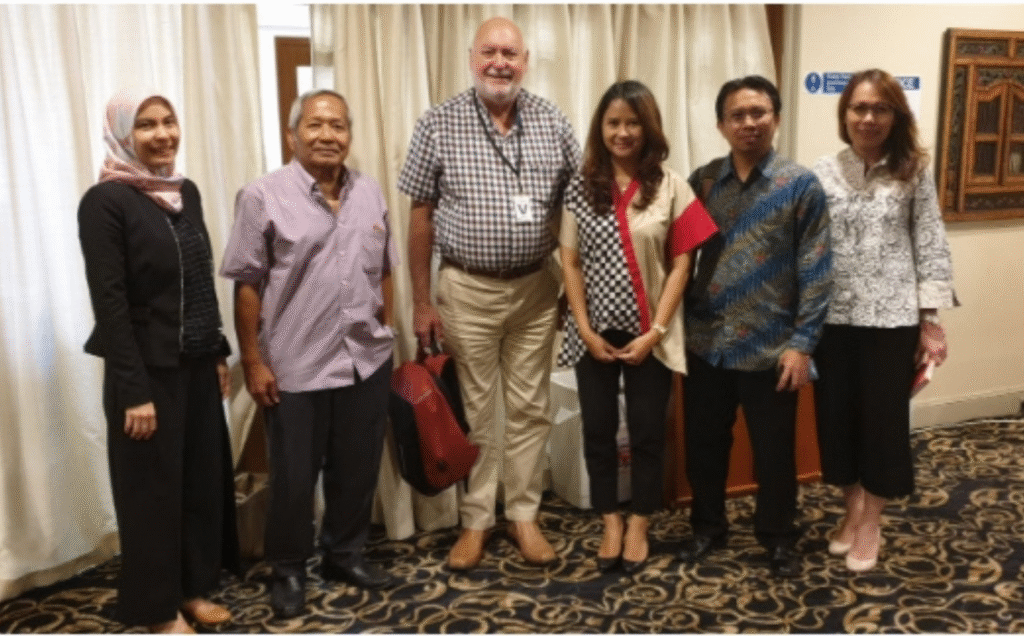
Roemah Kelapa Indonesia (RoeKI), visited Sydney, Australia to introduce the vast potential of Indonesia’s coconut sector and to engage with prospective investors. The visit highlighted the importance of government support in fostering strong bilateral cooperation, enabling Indonesia to unlock its extraordinary coconut resources. Through international partnerships, RoeKI seeks to strengthen the industry, empower millions of farmers, and position Indonesia as a global leader in sustainable coconut-based products.
Mr. Ir. Mulyadi Sukandar, representing Roemah Kelapa Indonesia (RoeKI), his visit was aimed at promoting awareness of the current state and challenges of the Indonesian coconut sector while actively engaging with potential investors.
During the program, Mr. Sukandar highlighted Indonesia’s vast coconut resources and the immense opportunities that lie within developing a sustainable, integrated coconut industry. His presentation emphasized the need for strategic investment and partnerships to strengthen Indonesia’s role as a global leader in coconut-based products.
This visit also underscored the importance of government support in fostering strong bilateral cooperation. Building good relations between nations is vital to unlock the extraordinary potential of Indonesian coconuts—both in terms of economic value and sustainable development.
RoeKI believes that through collaborative efforts with international stakeholders, Indonesia can maximize the value of its coconut industry, empower millions of farmers, and contribute significantly to global food security and renewable resources.


WURZBURG - GERMANY
Millennial Movement for a Sustainable Coconut Future

Since its inception, RoeKI has recognized the unique role of Indonesia’s millennial generation as both change-makers and guardians of the nation’s future. This generation, deeply connected to global conversations on environmental stewardship, sustainability, and social equity, has shown remarkable enthusiasm for transforming the coconut sector into a model of sustainable development.
Through workshops, campus collaborations, social media campaigns, and volunteer programs in coconut-growing regions, RoeKI engages millennials not only as supporters but as active participants in shaping solutions. They join field visits to learn about agroforestry systems, assist in digital mapping of plantations, and promote zero-waste coconut utilization. Many have become advocates for farmer welfare, working to ensure that the people behind Indonesia’s “tree of life” gain fair income and recognition for their contributions.
This synergy between RoeKI and millennials creates a vibrant ecosystem where innovation, environmental care, and cultural pride intersect. By combining youthful energy with deep-rooted agricultural traditions, RoeKI and its millennial partners are laying the foundation for a coconut industry that thrives economically, sustains the planet, and uplifts farming communities for generations to come.
BREMEN - GERMANY
Engagement with the Indonesian Diaspora: Strengthening Nationalism and Global Opportunities
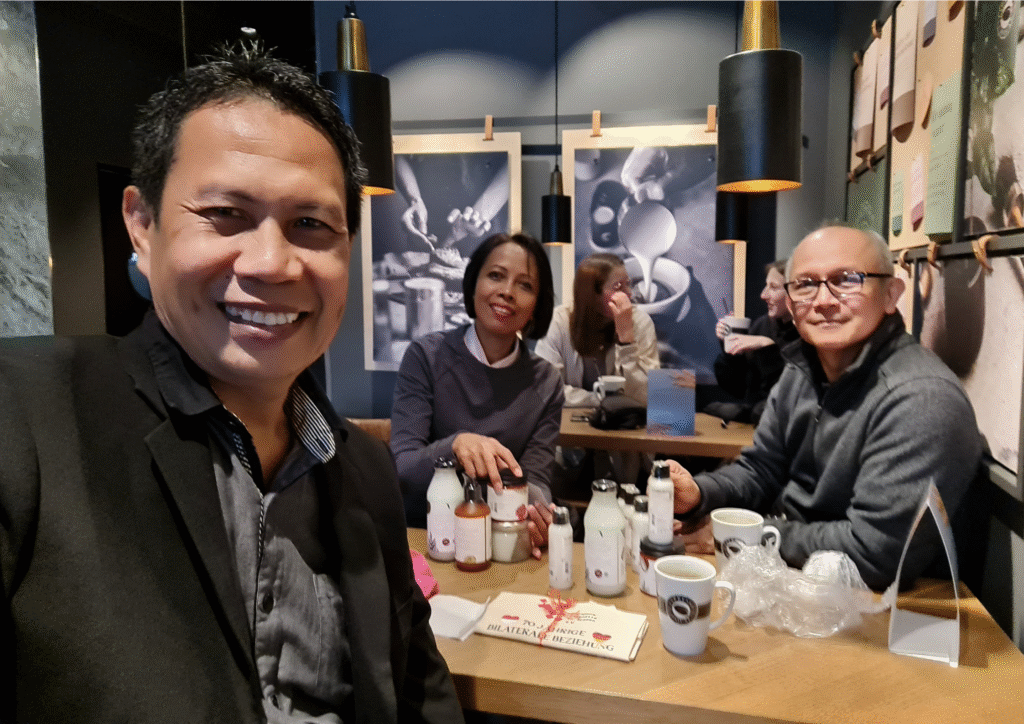
RoeKI actively cultivates strong communication and partnerships with the Indonesian diaspora around the world—friends and compatriots who live, study, and work abroad yet remain deeply connected to their homeland. This vibrant community shares a passionate nationalism and commitment to advancing Indonesia’s coconut industry on the global stage.
A notable example is RoeKI’s collaboration with Mrs. Dami Frese and Mr. Yadi, two dedicated Indonesian diaspora leaders based in Europe. Together, they formed a partnership to participate in a prestigious crowdfunding competition in Bremen, Germany. Their joint project focused on an innovative insulator product made from coconut husk fiber (cocofiber), which, thanks to their combined efforts, proudly secured third place in the competition.
This collaboration exemplifies how the spirit and nationalism of Indonesians abroad can catalyze tangible success for the coconut sector. It inspires young Indonesians and students overseas, fostering pride and motivation to explore entrepreneurial and export opportunities related to coconut by-products. Furthermore, it energizes cocofiber advocates and innovators, encouraging them to scale sustainable products globally—building not only Indonesia’s economic future but also its image as a leader in eco-friendly innovation.
WURZBURG - GERMANY
Millennial Movement for a Sustainable Coconut Future

Since its inception, RoeKI has recognized the unique role of Indonesia’s millennial generation as both change-makers and guardians of the nation’s future. This generation, deeply connected to global conversations on environmental stewardship, sustainability, and social equity, has shown remarkable enthusiasm for transforming the coconut sector into a model of sustainable development.
Through workshops, campus collaborations, social media campaigns, and volunteer programs in coconut-growing regions, RoeKI engages millennials not only as supporters but as active participants in shaping solutions. They join field visits to learn about agroforestry systems, assist in digital mapping of plantations, and promote zero-waste coconut utilization. Many have become advocates for farmer welfare, working to ensure that the people behind Indonesia’s “tree of life” gain fair income and recognition for their contributions.
This synergy between RoeKI and millennials creates a vibrant ecosystem where innovation, environmental care, and cultural pride intersect. By combining youthful energy with deep-rooted agricultural traditions, RoeKI and its millennial partners are laying the foundation for a coconut industry that thrives economically, sustains the planet, and uplifts farming communities for generations to come.
BREMEN - GERMANY
Engagement with the Indonesian Diaspora: Strengthening Nationalism and Global Opportunities

RoeKI actively cultivates strong communication and partnerships with the Indonesian diaspora around the world—friends and compatriots who live, study, and work abroad yet remain deeply connected to their homeland. This vibrant community shares a passionate nationalism and commitment to advancing Indonesia’s coconut industry on the global stage.
A notable example is RoeKI’s collaboration with Mrs. Dami Frese and Mr. Yadi, two dedicated Indonesian diaspora leaders based in Europe. Together, they formed a partnership to participate in a prestigious crowdfunding competition in Bremen, Germany. Their joint project focused on an innovative insulator product made from coconut husk fiber (cocofiber), which, thanks to their combined efforts, proudly secured third place in the competition.
This collaboration exemplifies how the spirit and nationalism of Indonesians abroad can catalyze tangible success for the coconut sector. It inspires young Indonesians and students overseas, fostering pride and motivation to explore entrepreneurial and export opportunities related to coconut by-products. Furthermore, it energizes cocofiber advocates and innovators, encouraging them to scale sustainable products globally—building not only Indonesia’s economic future but also its image as a leader in eco-friendly innovation.
BAYERISCHE STAATSMINISTERIUM FUR WIRTSCHAFT UND MEDIEN ENERGIE UND TECHNOLOGIE - GERMANY
Since 2017 until 2024, Roemah Kelapa Indonesia (RoeKI) has been officially invited to participate in the Waste Management and Circular Economy Program in Germany, organized under the auspices of the Bavarian State Ministry for Economic Affairs, Media, Energy and Technology (Bayerische Staatsministerium für Wirtschaft und Medien, Energie und Technologie – Germany).
Through this program, RoeKI has actively engaged in:
Knowledge exchange and study visits to advanced German waste management facilities.
Capacity building in areas of recycling, renewable energy integration, and resource efficiency.
Networking and partnerships with German institutions, companies, and research organizations for future collaboration.
RoeKI’s consistent participation over seven consecutive years (2017–2024) reflects its long-term commitment to adopting global best practices in sustainable resource management and applying them in the Indonesian context—particularly in developing coconut-based circular economy models, biomass utilization, and eco-friendly product innovations.

BAYERISCHE STAATSMINISTERIUM FUR WIRTSCHAFT UND MEDIEN ENERGIE UND TECHNOLOGIE - GERMANY
Since 2017 until 2024, Roemah Kelapa Indonesia (RoeKI) has been officially invited to participate in the Waste Management and Circular Economy Program in Germany, organized under the auspices of the Bavarian State Ministry for Economic Affairs, Media, Energy and Technology (Bayerische Staatsministerium für Wirtschaft und Medien, Energie und Technologie – Germany).
Through this program, RoeKI has actively engaged in:
Knowledge exchange and study visits to advanced German waste management facilities.
Capacity building in areas of recycling, renewable energy integration, and resource efficiency.
Networking and partnerships with German institutions, companies, and research organizations for future collaboration.
RoeKI’s consistent participation over seven consecutive years (2017–2024) reflects its long-term commitment to adopting global best practices in sustainable resource management and applying them in the Indonesian context—particularly in developing coconut-based circular economy models, biomass utilization, and eco-friendly product innovations.

RoeKI’s Global Journey – ELEVATING INDONESIA’S COCONUT TO THE WORLD STAGE
RoeKI’s Global Journey – ELEVATING INDONESIA’S COCONUT TO THE WORLD STAGE
Since 2015, Roemah Kelapa Indonesia (RoeKI) has been actively engaged in initiatives to strengthen and transform Indonesia’s coconut sector. These efforts began with domestic capacity building, farmer engagement, and value chain analysis—laying the foundation for a bigger mission: positioning Indonesia’s coconut as a global icon of sustainability, culture, and economic opportunity.
By 2017, we took a decisive step into the international arena, bringing “Indonesia Coconut” to the spotlight at world-class events and trade fairs in Germany, Australia, the Netherlands, Sweden, and several other countries. These platforms have not only showcased coconut products but also introduced the world to the deeper story of Indonesian coconut heritage.
1. International Branding with a Purpose
RoeKI’s global branding strategy has centered on three core narratives:
Coconut as the Tree of Life: Grown in the equatorial belt, Indonesia’s coconut is a resilient, self-propagating, and highly versatile crop—where no part goes to waste. From roots to leaves, husk to water, every part serves food, shelter, energy, or craft.
Sustainability at the Core: In markets that are increasingly sensitive to environmental and ethical sourcing issues, RoeKI highlights that coconuts are inherently low-impact crops, thriving naturally without heavy chemical input, while supporting biodiversity and local ecosystems.
Cultural and Social Heritage: Coconut is inseparable from the life of Indonesian communities—embedded in traditions, ceremonies, livelihoods, and arts. It is not just a commodity; it is an authentic heritage Indonesia offers to the world.
2. The Importance of International Engagement
Linking and socializing Indonesia’s coconut story internationally is critical because:
Global Perception Matters: Overseas markets—especially in Europe and Australia—are highly attentive to environmental stewardship, fair trade practices, and traceability.
Sustainability-Driven Demand: Consumers increasingly choose products with proven sustainable origins, making RoeKI’s storytelling a competitive advantage.
Market Access & Networking: International forums open doors for export partnerships, investment, and technology exchange.
3. The Technology and Market Imperative
For Indonesia to fully capitalize on its coconut potential, RoeKI emphasizes the urgent need for:
Technology Upgrades: From plantation management to downstream processing, modern innovations—such as tissue culture, automation, and blockchain traceability—are essential to meet global quality standards.
Expanded Marketing Space: Active participation in global exhibitions, trade missions, and B2B networking events ensures that Indonesian coconut derivatives—ranging from virgin coconut oil to activated carbon—gain visibility and secure premium markets.
4. A Mission that Combines Heritage and Modernity
RoeKI’s work bridges the rich heritage of Indonesia’s coconut culture with cutting-edge global market demands. By doing so, it ensures that this “Tree of Life” continues to nourish communities, preserve traditions, and contribute to sustainable economic growth—while positioning Indonesia as the undisputed leader in the world coconut industry.
TRADE AND INVESTMENT QUEENSLAND - AUSTRALIA

SYLVIA TEN HOUTEN - HOLLAND

AACHENER GESELLSCHAFT FUR INNOVATION UND TECHNOLOGIETRANSFER mbH - AGIT, AACHEN - GERMANY
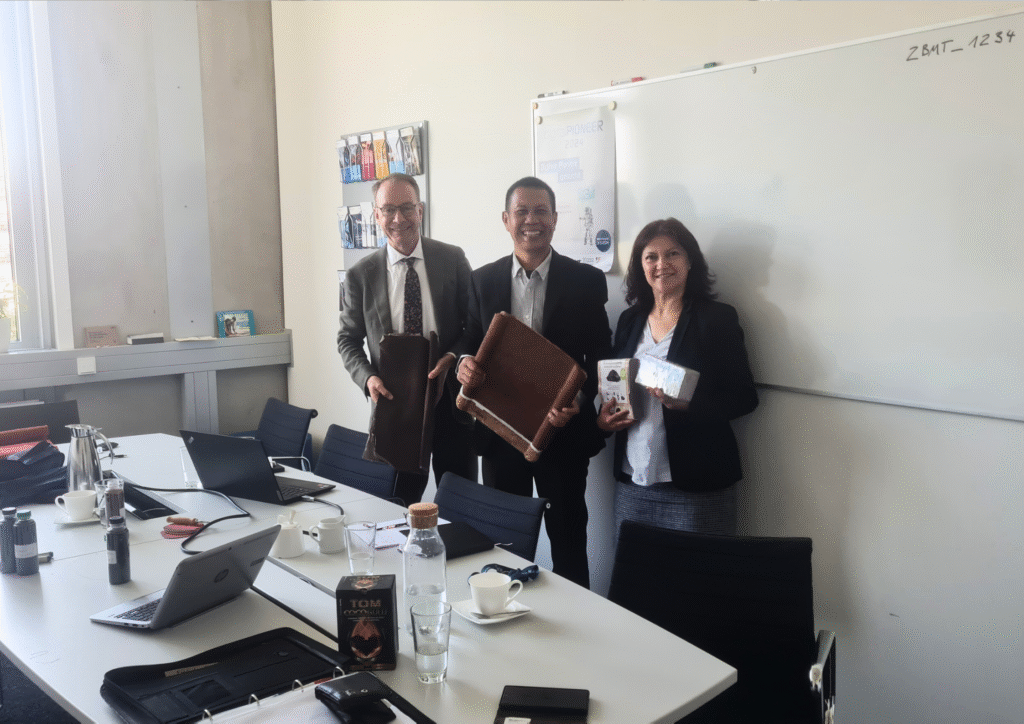
BERLIN - GERMANY

Since 2015, Roemah Kelapa Indonesia (RoeKI) has been actively engaged in initiatives to strengthen and transform Indonesia’s coconut sector. These efforts began with domestic capacity building, farmer engagement, and value chain analysis—laying the foundation for a bigger mission: positioning Indonesia’s coconut as a global icon of sustainability, culture, and economic opportunity.
By 2017, we took a decisive step into the international arena, bringing “Indonesia Coconut” to the spotlight at world-class events and trade fairs in Germany, Australia, the Netherlands, Sweden, and several other countries. These platforms have not only showcased coconut products but also introduced the world to the deeper story of Indonesian coconut heritage.
1. International Branding with a Purpose
RoeKI’s global branding strategy has centered on three core narratives:
Coconut as the Tree of Life: Grown in the equatorial belt, Indonesia’s coconut is a resilient, self-propagating, and highly versatile crop—where no part goes to waste. From roots to leaves, husk to water, every part serves food, shelter, energy, or craft.
Sustainability at the Core: In markets that are increasingly sensitive to environmental and ethical sourcing issues, RoeKI highlights that coconuts are inherently low-impact crops, thriving naturally without heavy chemical input, while supporting biodiversity and local ecosystems.
Cultural and Social Heritage: Coconut is inseparable from the life of Indonesian communities—embedded in traditions, ceremonies, livelihoods, and arts. It is not just a commodity; it is an authentic heritage Indonesia offers to the world.
2. The Importance of International Engagement
Linking and socializing Indonesia’s coconut story internationally is critical because:
Global Perception Matters: Overseas markets—especially in Europe and Australia—are highly attentive to environmental stewardship, fair trade practices, and traceability.
Sustainability-Driven Demand: Consumers increasingly choose products with proven sustainable origins, making RoeKI’s storytelling a competitive advantage.
Market Access & Networking: International forums open doors for export partnerships, investment, and technology exchange.
3. The Technology and Market Imperative
For Indonesia to fully capitalize on its coconut potential, RoeKI emphasizes the urgent need for:
Technology Upgrades: From plantation management to downstream processing, modern innovations—such as tissue culture, automation, and blockchain traceability—are essential to meet global quality standards.
Expanded Marketing Space: Active participation in global exhibitions, trade missions, and B2B networking events ensures that Indonesian coconut derivatives—ranging from virgin coconut oil to activated carbon—gain visibility and secure premium markets.
4. A Mission that Combines Heritage and Modernity
RoeKI’s work bridges the rich heritage of Indonesia’s coconut culture with cutting-edge global market demands. By doing so, it ensures that this “Tree of Life” continues to nourish communities, preserve traditions, and contribute to sustainable economic growth—while positioning Indonesia as the undisputed leader in the world coconut industry.
TRADE AND INVESTMENT QUEENSLAND - AUSTRALIA

SYLVIA TEN HOUTEN - HOLLAND

AACHENER GESELLSCHAFT FUR INNOVATION UND TECHNOLOGIETRANSFER mbH - AGIT, AACHEN - GERMANY

BERLIN - GERMANY

FEDERAL MINISTRY FOR ECONOMIC AFFAIRS AND CLIMATE ACTION
FEDERAL MINISTRY FOR ECONOMIC AFFAIRS AND CLIMATE ACTION
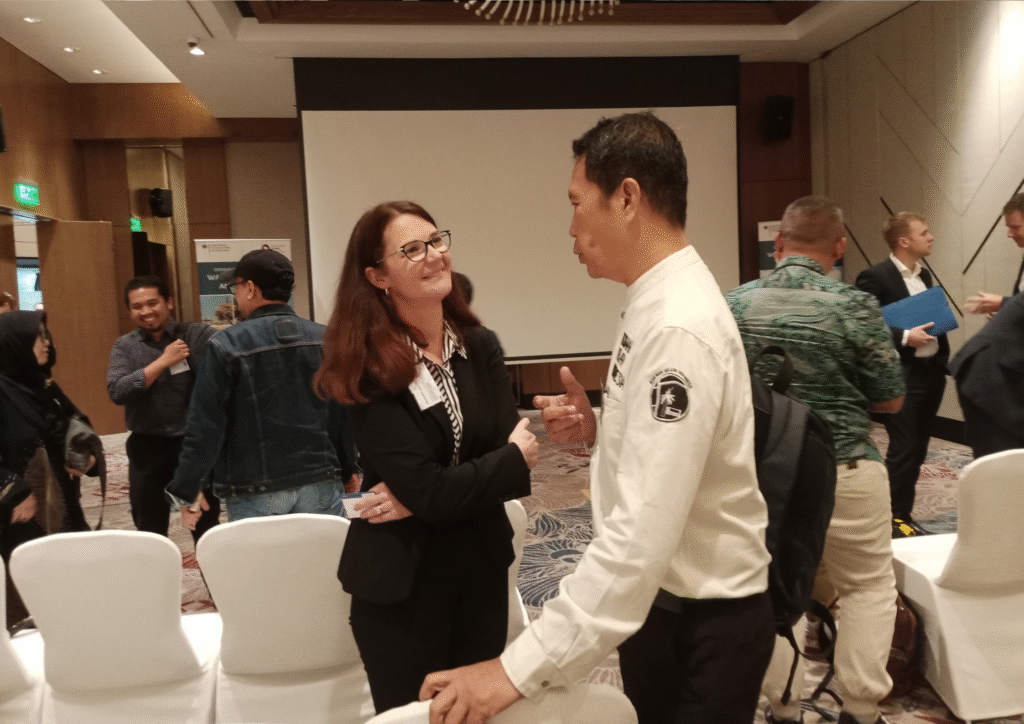
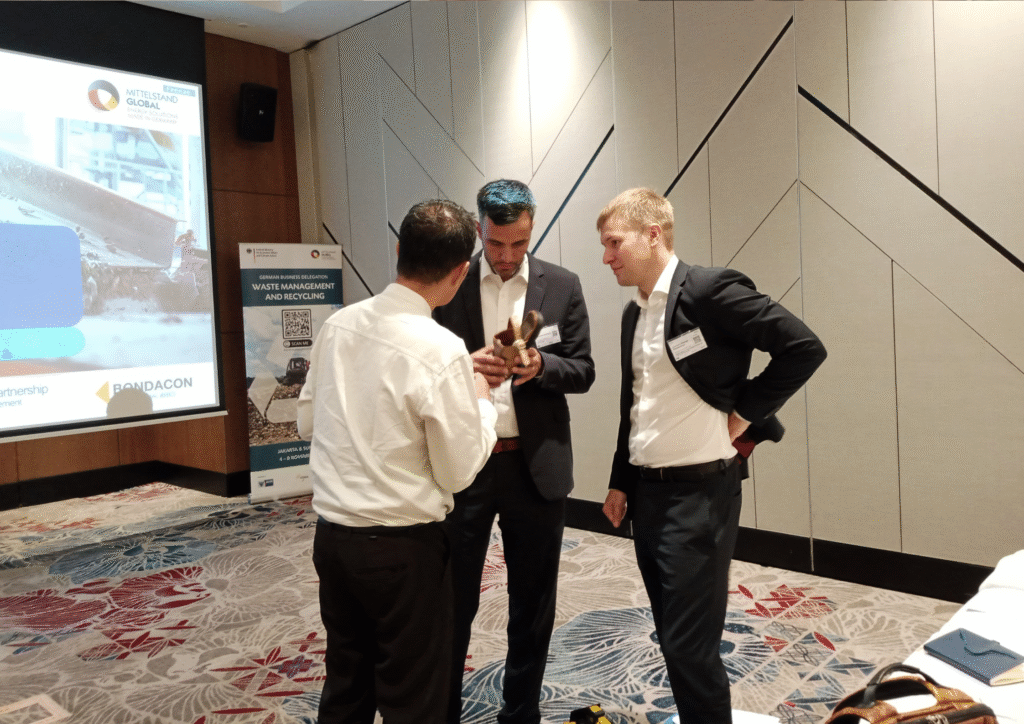
WASTE MANAGEMENT AND RECYCLING - GERMANY
Waste Management Program in Germany – Invitation by Bayerische Staatsministerium für Wirtschaft und Medien, Energie und Technologie
Since 2017 until 2024, Roemah Kelapa Indonesia (RoeKI) has been officially invited to participate in the Waste Management and Circular Economy Program in Germany, organized under the auspices of the Bavarian State Ministry for Economic Affairs, Media, Energy and Technology (Bayerische Staatsministerium für Wirtschaft und Medien, Energie und Technologie – Germany).
Through this program, RoeKI has actively engaged in:
Knowledge exchange and study visits to advanced German waste management facilities.
Capacity building in areas of recycling, renewable energy integration, and resource efficiency.
Networking and partnerships with German institutions, companies, and research organizations for future collaboration.
RoeKI’s consistent participation over seven consecutive years (2017–2024) reflects its long-term commitment to adopting global best practices in sustainable resource management and applying them in the Indonesian context—particularly in developing coconut-based circular economy models, biomass utilization, and eco-friendly product innovations.


WASTE MANAGEMENT AND RECYCLING - GERMANY
Waste Management Program in Germany – Invitation by Bayerische Staatsministerium für Wirtschaft und Medien, Energie und Technologie
Since 2017 until 2024, Roemah Kelapa Indonesia (RoeKI) has been officially invited to participate in the Waste Management and Circular Economy Program in Germany, organized under the auspices of the Bavarian State Ministry for Economic Affairs, Media, Energy and Technology (Bayerische Staatsministerium für Wirtschaft und Medien, Energie und Technologie – Germany).
Through this program, RoeKI has actively engaged in:
Knowledge exchange and study visits to advanced German waste management facilities.
Capacity building in areas of recycling, renewable energy integration, and resource efficiency.
Networking and partnerships with German institutions, companies, and research organizations for future collaboration.
RoeKI’s consistent participation over seven consecutive years (2017–2024) reflects its long-term commitment to adopting global best practices in sustainable resource management and applying them in the Indonesian context—particularly in developing coconut-based circular economy models, biomass utilization, and eco-friendly product innovations.
Active Role as Indonesia’s Delegate in Europe: Expanding Global Reach for the Coconut Industry
RoeKI has been consistently recognized for its expertise and leadership in the Indonesian coconut sector, often being invited as part of the official Indonesian delegation to visit and participate in technical meetings, trade discussions, and industry exhibitions in Germany and other European countries.
These engagements serve multiple strategic purposes. On one hand, they allow RoeKI to socialize and promote the vast potential of Indonesia’s coconut resources — from its unparalleled biodiversity and sustainable cultivation methods to the wide range of value-added products ready for global markets. On the other hand, they function as a powerful platform for securing market access, building long-term partnerships, and attracting investment into Indonesia’s coconut downstream industry.
Through targeted presentations, networking sessions, and direct business-to-business dialogues, RoeKI not only strengthens the country’s agricultural brand image but also opens real opportunities for export growth and technology transfer.
RoeKI international missions have yielded measurable benefits, including increased international recognition of Indonesia as a leading coconut-producing nation, the establishment of new export contracts and distribution channels in Europe, and the initiation of collaborative projects with investors and research institutions. By turning each invitation into a bridge between Indonesia’s coconut heritage and the demands of modern global markets, RoeKI ensures that the “Tree of Life” stands tall — both at home and on the world stage.

HAMBURG - GERMANY
Strategic Engagement with Foreign Governments: Building Bridges for Indonesia’s Coconut Industry
RoeKI actively fosters communication and partnerships with foreign governments to promote Indonesia’s coconut sector and create avenues for collaboration. A key milestone in this effort was a high-level meeting with a senior official from the federal state government of Hamburg, Germany.
This dialogue served as a crucial platform to exchange insights on sustainable agricultural practices, explore potential joint ventures, and discuss ways to enhance trade and investment flows between Indonesia and the Hamburg region. RoeKI presented Indonesia’s strengths in coconut production, its sustainability commitments, and ongoing innovations in coconut-based products.
This engagements have proven instrumental in elevating Indonesia’s profile as a reliable and innovative partner in the global coconut industry. The meeting with Hamburg’s government catalyzed new opportunities for market access, technical cooperation, and investment, further integrating Indonesia’s coconut value chain into international networks. This not only strengthens bilateral relations but also accelerates the development and modernization of Indonesia’s coconut industry, benefiting farmers and national economic growth.
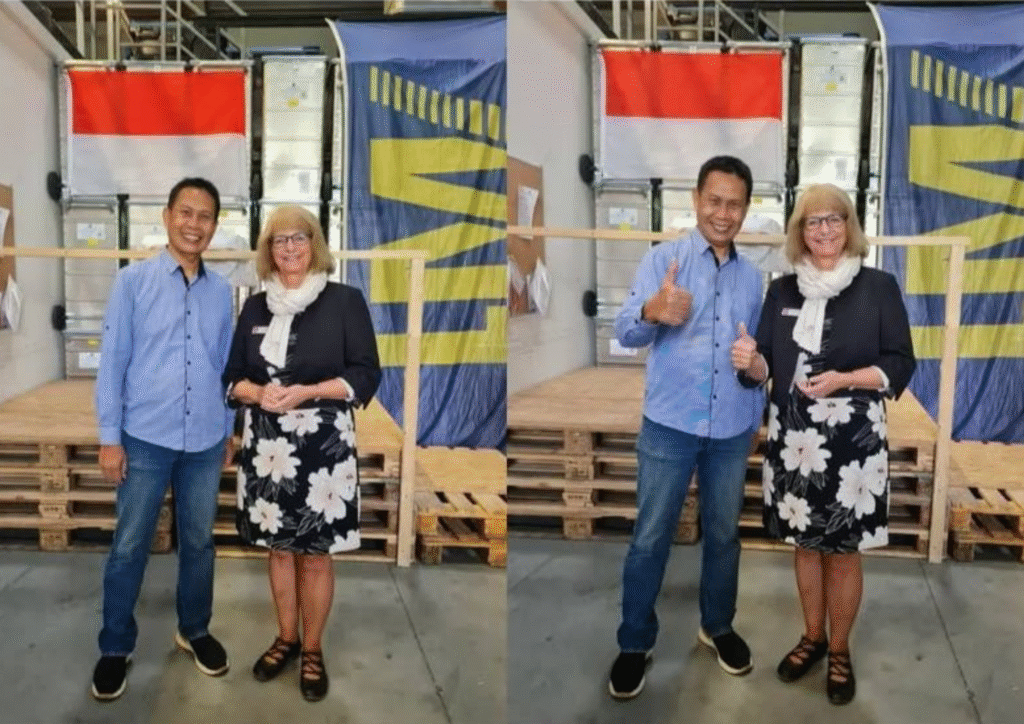
MRS. URTE STEINBER, GOUVERNER OF PINNEBERG, HAMBURG - GERMANY
Active Role as Indonesia’s Delegate in Europe: Expanding Global Reach for the Coconut Industry
RoeKI has been consistently recognized for its expertise and leadership in the Indonesian coconut sector, often being invited as part of the official Indonesian delegation to visit and participate in technical meetings, trade discussions, and industry exhibitions in Germany and other European countries.
These engagements serve multiple strategic purposes. On one hand, they allow RoeKI to socialize and promote the vast potential of Indonesia’s coconut resources — from its unparalleled biodiversity and sustainable cultivation methods to the wide range of value-added products ready for global markets. On the other hand, they function as a powerful platform for securing market access, building long-term partnerships, and attracting investment into Indonesia’s coconut downstream industry.
Through targeted presentations, networking sessions, and direct business-to-business dialogues, RoeKI not only strengthens the country’s agricultural brand image but also opens real opportunities for export growth and technology transfer.
RoeKI international missions have yielded measurable benefits, including increased international recognition of Indonesia as a leading coconut-producing nation, the establishment of new export contracts and distribution channels in Europe, and the initiation of collaborative projects with investors and research institutions. By turning each invitation into a bridge between Indonesia’s coconut heritage and the demands of modern global markets, RoeKI ensures that the “Tree of Life” stands tall — both at home and on the world stage.

HAMBURG - GERMANY
Strategic Engagement with Foreign Governments: Building Bridges for Indonesia’s Coconut Industry
RoeKI actively fosters communication and partnerships with foreign governments to promote Indonesia’s coconut sector and create avenues for collaboration. A key milestone in this effort was a high-level meeting with a senior official from the federal state government of Hamburg, Germany.
This dialogue served as a crucial platform to exchange insights on sustainable agricultural practices, explore potential joint ventures, and discuss ways to enhance trade and investment flows between Indonesia and the Hamburg region. RoeKI presented Indonesia’s strengths in coconut production, its sustainability commitments, and ongoing innovations in coconut-based products.
This engagements have proven instrumental in elevating Indonesia’s profile as a reliable and innovative partner in the global coconut industry. The meeting with Hamburg’s government catalyzed new opportunities for market access, technical cooperation, and investment, further integrating Indonesia’s coconut value chain into international networks. This not only strengthens bilateral relations but also accelerates the development and modernization of Indonesia’s coconut industry, benefiting farmers and national economic growth.
